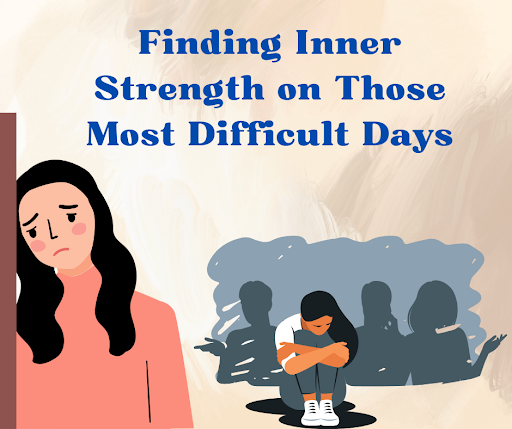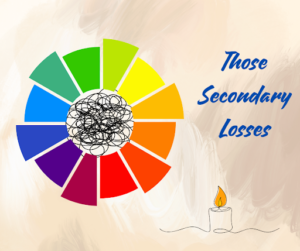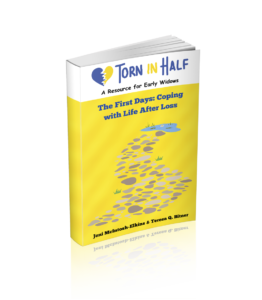When traveling anywhere, we would like clear directions to our destination. As much as we would like to provide you with a clear map through grief, such a map simply does not exist. It is a journey that is unique to everyone and every relationship it represents. There are twists, turns, obstacles, and days when you may feel lost, unsure of how to move forward. We have both been there. Days when getting out of bed is a huge accomplishment, and putting on a brave or happy face is a massive chore and feels fake.
Early grief, that time right after our loss, can be the most difficult to travel through. Emotions are everywhere, and nothing is familiar. Everything that remains feels foreign. Life is fragile at this point. At this point, just remember to breathe and take that next step. Slowly, sometimes very slowly, small things will appear to help you feel a little more grounded, a little more capable, a little more like yourself again.
Our blog isn’t filled with magic answers. As everyone’s journey is different, so are the answers that are needed. So we opted to share with you the real mental health strategies that carried us through the days we didn’t think we could survive in the hopes that they’ll help you in your travels.
1. Let Go of trying to “Be Okay” & feeling like you need to “Be Okay”
We often find ourselves being the ones to be strong and OK. We might be doing this for our kids, so we can show up well at work, or worse, when the person “helping” you needs you to be OK. One of the most significant mental shifts we had to make was giving ourselves permission not to be okay and allowing others to see that we were not okay. At first, it was difficult to allow ourselves to open up and be vulnerable to the fact that we were not doing as well as everyone else wanted us to be. In the end, it was very freeing and allowed us to process our emotions better and to move forward in our journey
Grief is not a performance, and can be messy. There’s no trophy for being strong all the time. In fact, when we’re forcing ourselves to be strong, it’s not healthy. Once we stopped trying to prove we were functioning and started telling the truth, even just to ourselves, it lifted a weight we didn’t even realize we were carrying.
Teresa honestly responded with tears in her eyes to a co-worker as they were passing in the hallway, “You really want to know how me and the boys are doing? Not great, in fact this sucks and I’m barely hanging on.” The shock and discomfort of her reply lessened the casual school, “Hey, how are you doing?” questions that just seemed like we’re in the wrong place at the wrong time.
2. Find Your Special Space
Find a place or routine that brings you peace and quiet. It is taking that minute or five to just be where you feel safe and a moment of peace. A place where we are not doing and fixing. For Teresa, this was out on her front porch with a cup of coffee in the morning. Just being with nature and the dogs. For Jeni, this was time to write in the journal each morning, just a space to get out her thoughts. Find a space that can anchor and ground you. This helps us remember that we are in charge of our journey, even when we are processing the chaos of our loss.
3. Find Words for What You Feel
Grief can be so overwhelming that it’s hard to even describe. The feelings swirl and can be more intense and strange than what we’ve ever felt before. Take time to journal, make voice notes, and talking with trusted friends, coaches, or therapists can give you the language. Once you can put a name to the feeling and know that it’s normal, the feelings can begin to be processed. Naming emotions reduces their power.
4. It’s OK to Set Boundaries to Protect Yourself and Your Process
Setting healthy boundaries can be difficult. They are essential in daily life but take on more meaning when dealing with loss. We get to set healthy boundaries that work for us and our family. Some people mean well but say or do the wrong things. We call these the “unhelpful” ones. They may show up unannounced, trap you in the store, or do other things that they think are helpful but are not. They may be the ones who say those things that are unhelpful or worse, hurtful. You may have heard, “At least he didn’t have cancer and linger.” “He’s in a better place.” “You’re so strong.” “You’ll find someone else.” “You have to be strong for your kids.” You get the idea. Give yourself permission to pull back from conversations and people who aren’t safe or helpful. Protecting your peace mattered more than pleasing anyone else. Here’s an article we wrote on the “Helpful” Others and one on Setting Healthy Boundaries for additional support.
5. Reframing Advice
When we suffer a loss in our lives, we often find that others around us will offer advice about, well, everything. As we have worked in grief, one of the questions we get asked is how to handle that advice. We recognize that not all advice will work for your situation, so here is our suggestion:
When you receive the advice, accept it with gratitude. No matter the source or the intent, receiving it with gratitude will put you in a better frame of mind. Then, take a look at the information and determine if it will serve you. If it does, it is a golden nugget to be treasured. Put it where you can access it when you need it and treasure it. If it does not serve you, it is a chunk of coal that you can toss in a fire to fuel your journey. That way, the advice will either help you or help you as you move forward.
6. Ask and Get Help
Know that you don’t have to do this alone. Losing a spouse is one of the hardest things that will ever happen to many of us. We are often used to managing everything, supporting others, and being the strong ones. Accepting help, letting others bless you, and humbling yourself to ask for help isn’t a sign of weakness. It’s a sign of strength. Find a way to accept help, even if you don’t think you need it. When someone asks how they can help, having a list of chores or tasks you can share is a great way to allow them to help and get things done. You can let a friend cart the kids, grocery shop, run errands, and there are many other ways people can help and support you.
Another type of help is mental health support. Seeking therapy, support groups, or grief coaching is a great way to work through the challenges of grief.
Remember that needing help doesn’t make you weak. It makes you wise.
This one was hard for Teresa. As the go-to person and get-it-done gal in her circle, she never asked anyone for help. She was the one who asked for help. Allowing a youth group to weed the yard and friends to clean her home was a first step. Seeking therapy and Griefshare.org were the next steps and helped her process her grief and begin to move forward.
7. Practiced Radical Self-Care & Rest
Grief is exhausting. Emotional pain drains your physical energy. Taking the time to be and rest your soul, mind, and body is so important. Be mindful of overdoing, it can be a coping mechanism, but also a way to avoid grief and rest.
In grief, it’s critical to take radical care of yourself. Rest, eating healthy, doing things to rejuvenate your body, soul, and mind are necessary. It is not selfish.
It’s OK to take care of yourself as a resource for self-care.
Take the time you need to rest with no guilt. Take naps, cancel plans that aren’t right at this time, stop pretending you’re “fine,” and take care of yourself in whatever way is nourishing.
Grief doesn’t magically end. Some days are easier than others. Some days, the Widow Wave hits us. The steps above can help you as you find your way. Moving through grief is a slow process, and strength sometimes looks like softness.
You’re not expected to have it all together. You’re expected to keep breathing. That alone is enough.
If you’re in one of those hard days right now, this is us reaching across the widowhood void to say: We see you. We believe in you. And we’re walking with you.
Let’s keep this conversation going.
How have you gotten through your hardest days? Leave a comment or share this post. Someone else might need to know they’re not the only one feeling this way.
Peace & Blessings,
Teresa & Jeni
PS: For additional support, you can download our free copy of 10 Ways to Move Forward After Loss
The First Days: Coping with Life After Loss is a resource for the first days after a loss – available on Amazon in paperback.
My Journey as a Widow: A Widow’s First Journal is a follow-up journal for processing complex emotions and moving forward with hope. It is available in paperback on Amazon.
Follow us on Social Media:
Facebook: https://www.facebook.com/TornInHalfwidows/
LinkedIn: https://www.linkedin.com/company/torn-in-half/




